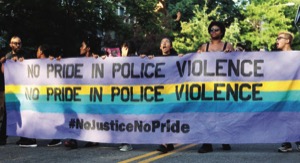
On the Saturday of San Diego’s Pride weekend, there was a protest of about 50 people at noon, at Sixth and Upas, organized by the San Diego Chapter of No Justice, No Pride. I spoke to Adrian Scott (pronouns: they, them, theirs), a protest organizer, and Adam Powers (pronouns: she, her, hers), a protest participant, about it. I wanted to get a sense of what people involved with the local No Justice, No Pride protest were about in their own words, hearing what they’re for and against, and why. And because this is a column in large part about the transgender community, I wanted to hear from some of the transgender voices who were involved with the protest.
And, I thought I’d share.
“We are the San Diego chapter of No Justice, No Pride,” said Adrian. “Locally started by people within the community that would like to see change and awareness brought to Pride events – just the seriousness of oppression and injustices that occur within our community and in San Diego.”
The protest sign Adam highlighted: “The first Pride Was a Riot”. And, she added that many of the signs were a reminder of what the roots of Pride are, and what Pride stands for.
“I think that the oppression that we’re currently experiencing is a very intersectional oppression,” said Adam, “It’s very easy to look at places like Hillcrest; it’s very easy to look at things like the Pride parade and think that the checkbox of queer freedom has been checked. And, I think that checkbox thinking is incredibly dangerous because it inspires you to stop acting; it disincentives you from continuing to dig into the problem.”
“… It’s also easy to look at California and think ‘We’re completely free here.’ But as a trans woman, I do not feel any less threatened going to the bathroom of my gender than I would in most other states … Just because I’m in California, I do not feel I get to act exactly as I choose. Even if there’s somewhere in the California rulebooks a law that says certain bathrooms need to be gender neutral or people can go to the bathrooms they want to go to, that’s not going to keep a person from possibly acting aggressively towards me.”
“Similarly,” Adam added. “It’s easy to look at some of the things that have happened to black folks in places like Ferguson and say ‘We’re in California, and that really couldn’t happen here.’ But, if you look at Alfred Olango, just a little bit east in El Cajon, we are really no different than any other place in the country that is experiencing oppression along intersectional lines.”
“Taking a cue from [Washington D.C.’s No Justice, No Pride],” stated Adrian, “we decided to do something similar here in order to bring about awareness of the erasure of black trans women in the community honoring Marsha P. Johnson and Sylvia Rivera.”
Both Adrian and Adam brought up the corporatization of Pride, and both mentioned Wells Fargo, a San Diego Pride Supporting Partner.
“Being sponsored by Wells Fargo,” Adrian said, “they are the number one monetary contributor to DAPL [the Dakota Access Pipeline].”
“It’s rather strange to see our community celebrate organizations and companies like that,” Adrian added. “When they’re killing us, they’re killing our land, they’re killing our people – they continue to target black and brown people.”
In the near future I’ll likely be sitting down with No Justice, No Pride activists and writing about their take on police in queer spaces. Just from talking to Adrian and Adam, I can see that’s a column in and of itself.
San Diego’s No Justice, No Pride asks of San Diego Pride were previously printed in a letter to the editor (https://lgbtweekly.jeffjungblut.com/2017/07/13/letters-reclaiming-pride-aresponse-from-ftw-liberation/). These are worth a look.
Adam summed up why she protested: “I was really glad to be able to come together with a bunch of my activist friends and contribute to the Pride atmosphere in a way I thought that was really necessary.”











